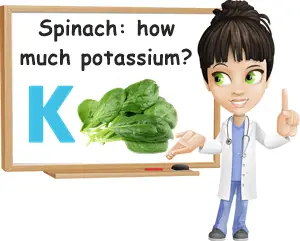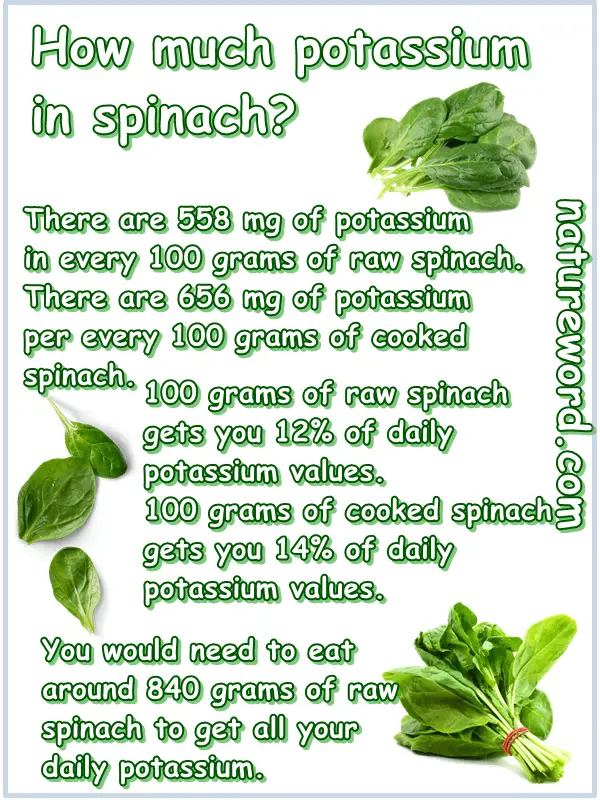Do you need to get more potassium in your diet? Are you looking for foods that are both a good source of potassium and readily available? Then look no further than spinach. In addition to being available year round, spinach is nutritionally dense, with a good content of dietary potassium. There’s a reason why it tops every list there is, from anti-inflammatory foods to energizing foods to plain healthy foods.

How much potassium in spinach?
- There are 558 mg (milligrams) of potassium in 100 grams of raw spinach.
- There are 656 mg of potassium in 100 grams of cooked spinach.
- There are 466 mg of potassium in 100 grams of boiled and drained spinach.
- There are 301 mg of potassium in 100 grams of frozen, cooked spinach.
- There are 346 mg of potassium in 100 grams of canned, cooked spinach.
Is spinach high in potassium?
With a potassium content of 12% of daily values for the average adult in every 100 grams, spinach is not technically a potassium rich food. However, it’s one of the foods highest in potassium, higher than broccoli, Brussels sprouts, squash, bananas, avocado, oranges and orange juice. Two of the biggest benefits of choosing spinach for your daily potassium are that it’s nutritionally dense and one of those foods in season all year long.

How high in potassium is spinach?
- 100 grams of raw spinach provides 11.87% of daily potassium values for the average adult, estimated at 12% potassium.
- 100 grams of cooked spinach provides 13.95% of daily potassium values for the average adult, estimated at 14% potassium.
- 100 grams of boiled and drained spinach provides 10% of daily potassium values.
- 100 grams of frozen, cooked spinach provides 6.4% of daily potassium values.
- 100 grams of canned, cooked spinach provides 7.3% of daily potassium values.
Spinach potassium content vs other foods
Spinach has a better potassium content than most other fruits and vegetables, except for leafy greens. Spinach and other leafy green vegetables are typically equally good sources of the mineral. Spinach is however lower in potassium than most nuts and seeds.
Nevertheless, the serving size for spinach is bigger than the serving size for nuts and seeds which means you actually get more of your daily potassium from eating spinach rather than nuts and seeds. For example, the serving size for spinach is typically 100 to 200 grams, whereas the serving size for nuts and seeds is typically only 28 to 30 grams, or about one ounce. However, nuts and seeds remain an excellent source of potassium, and are nutritionally dense, which makes them just as good an option for daily potassium as spinach.
- Spinach potassium content: 12% of daily values for the average adult per 100 grams of raw spinach
- Broccoli potassium content: less than 7% of daily values
- Brussels sprouts potassium content: a little over 8% of daily values
- Beet leaves (beet greens) potassium content: over 16% of daily values
- Bananas potassium content: close to 8% of daily values
- Avocado potassium content: a little over 10% of daily values
- Apples potassium content: less than 2.3% of daily values
- Fava beans (broad beans) potassium content: 23% of daily values
- Butternut squash potassium content: 7.5% of daily values
- Oranges potassium content: less than 4% of daily values
- Orange juice potassium content: a little over 4% of daily values
- Cashews potassium content: 14% of daily values
- Chestnuts potassium content: a little over 10% daily values
Check also:
How much spinach do you have to eat to get your daily potassium?
You would have to eat around 840 grams of raw spinach to get all of your daily potassium. You would have to eat around 715 grams of cooked spinach to get all the potassium you need in a day. Of course, this is too much spinach to eat in a day which means you can’t rely on just this one vegetable to meet your daily potassium requirements – it’s not healthy, nor sustainable.
What are the benefits of eating spinach?
For one, spinach is a generous source of potassium, 100 grams providing close to 12% of daily values for the average adult, and magnesium, 100 grams providing 22% of daily values. This means spinach is good for high blood pressure, extrasystoles, palpitations and other forms of arrhythmia.
Eating the vegetable helps combat water retention and associated swelling and puffiness, and is good for muscle aches and painful muscle cramps. Calcium, phosphorus and magnesium in spinach contribute to good bone density, helping build strong bones and teeth.
Spinach is mucilaginous and thus easy on the stomach – it’s actually one of the few vegetables that are well tolerated in gastritis and acid reflux. High in manganese, with over 40% of daily values for the average adult in just 100 grams, spinach is good for fertility in both men and women.
Eating spinach raw provides good amounts of vitamin C with antiaging benefits – vitamin C protects cells from damage and induces the production of a structural protein called collagen that maintains good skin elasticity. Vitamin C further has scientifically proven anti-inflammatory effects, reducing levels of several inflammation markers in the body such as C-reactive protein and interleukin-6.
Spinach is both an anti-inflammatory food, and has immune system boosting properties. The immunomodulating action is owed, in part, to vitamin C which studies show enhances the activities of several immune system cells, contributing to the immune system response. Pro-vitamin A antioxidants in spinach further contribute to the immune system function by protecting the integrity of mucous membranes throughout the body.
Antioxidants with and without vitamin A activity advance eye health – pro-vitamin A carotenoids hold benefits for visual acuity, while antioxidants without vitamin A activity, namely lutein and zeaxanthin, reduce risks of cataract and age related macular degeneration.
Spinach is also a good food to eat in diabetes – for one, spinach is a low glycemic food which means it doesn’t raise blood sugar levels too much too fast. Moreover, potassium in spinach prevents low blood sugar and exerts a protective effect against excessively high blood sugar levels in diabetes, while magnesium is actively involved in stabilizing blood sugar levels.
Pregnant women can eat spinach to boost their intake of folate which helps prevent birth defects and bleeding in newborns. Additionally, spinach is a great source of iron and B vitamins which boost energy levels and vitality. Iron and vitamins B6 and B9 help make red blood cells and hemoglobin, and boost the capacity of hemoglobin to absorb oxygen, resulting in benefits for anemia, muscle weakness and generalized weakness, physical and mental fatigue.
